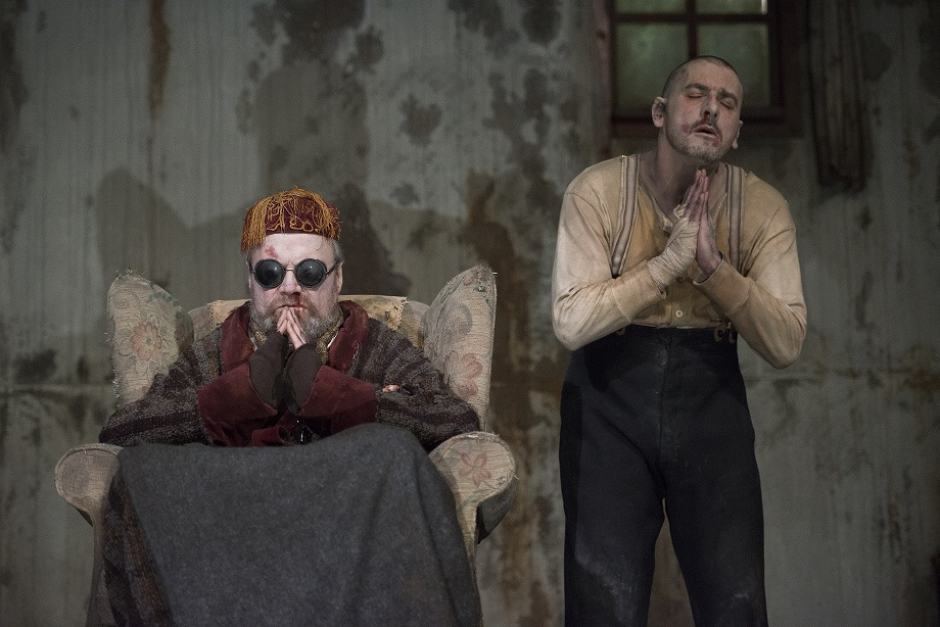Thu 25 Feb 2016 – Sat 12 Mar 2016
There is a moment in Endgame where Clov, the worn out, abused servant of the imperious Hamm, looks through a telescope at the audience and announces that he can see ‘A multitude…in transports…of joy’. The joke isn’t quite that the play is so deathly boring, miserable, bleak and repetitive that this is untrue, but rather, that the statement is both true and ironic simultaneously: the audience are both miserable and alienated and laughing simultaneously. As Nell (Barbara Rafferty), one of Hamm’s parents, confined to a dustbin downstage, observes at another time: ‘Nothing is funnier than unhappiness’.
Curiously, this scene with the telescope and the audience is cut from this production of Endgame. This is curious for three reasons. Firstly, it’s one of the funniest lines in the play. Secondly, because the Beckett estate is notoriously strict on his plays being performed exactly as they are written. The third reason is the perhaps the key: that this line, which places the audience in a state of uncertainty as to whether they ought to be amused or bored, alienated or laughing, doesn’t quite fit with the interpretation of Endgame that this production offers; one that largely turns the play into a dark farce rather than leaving the audience in the radical uncertainty that Beckett’s play demands.
Of course, because of the Beckett estate’s demands of strict fidelity to the text, every performance and production of Beckett is eerily the same, echoing his artistic obsessions with control, authority and repetition. It’s all here and it’s wonderful to watch: the decaying room; the music hall props including a three legged toy dog awaiting its ‘sex’; a fine shower of dust that leaks from the ceiling; a melancholy picture of a seaside holiday of yesteryear, an innocence which is lost and cannot come again.
It wasn’t the first time I’d seen Roy Cropper from Coronation Street in a Beckett play. Here, the actor who plays Cropper, David Neilson, plays Hamm, the blind, armchair-bound patriarch, with a compelling and unsettling note of hysteria, recalling the monstrous fragility of the dictators and colonisers which Endgame perhaps, so obliquely, allegorises. Chris Gascogyne (Coronation Street’s Peter Barlow), is a similarly wonderful Clov, capturing the echo of clown in the character’s name with a playful physical comedy, picking his malfunctioning leg up when he wants to walk, shaking the stepladder he is forever climbing with a wiggle of his arse. I’ve never seen an audience laugh so much at a Beckett play.
It’s the sort of humour that Beckett, who loved the early Hollywood comedies of Chaplin, Keaton and the Marx Brothers, admired and incorporated into his work. And yet it’s all too slick. There is a scene where Nagg (Peter Kelly), the other one of Hamm’s dustbin-consigned parents, tells a long, complicated joke about a tailor making a pair of trousers. As he tells the joke in a ‘raconteur’s voice’, he pauses to observe that he ‘never told it worse’. Only Nagg tells it too well, it’s hilarious.
And this is the problem with the production. The old, worn out jokes that Beckett inserts into the play, as well as the bleakly witty dialogue, is too snappy, too slick, and too comic. Theodor Adorno famously observed that understanding Endgame ‘can mean nothing other than understanding its incomprehensibility’. By making the jokes work, by making them fresh again, meaning is reactivated, since comedy becomes the meaning of each utterance, rather than a sequence of non-sequiturs and jokes whose disquieting nature is in the sense that language which was previously comprehensible is beginning to lose its meaning in the dead world that Beckett depicts. Hence why I dwelt so long on a missing line in this production, because this missing line is the crux of the play, it is the point where the audience are put into uncertainty about meaning or lack of it, comedy or its absence, indeed, they are confronted with the disquieting notion that these abstract, allegorical characters on stage might be like them. Without this line, and with the slickness of the comedy, the characters become clowns (rather than Clovs), separated from us, but comprehensible to us on the very terms that Beckett’s play ought to make us reject, or at least radically question.
Sure, this production is a good night out: it’s a joy to watch; it’s a sparkling black comedy. But does it understand Beckett, which is to say, does it understand his incomprehensibility? Probably not.
Tristan Burke

